|
Volume
1 of Artificial Eye's welcome 3-disc sets of the films of
Finnish director Aki Kaurismäki consisted of a trilogy
linked by a common theme. Volume 2 takes
a different tack. All three films star Kaurismäki favourite
Kati Outinen and feature a sprinkling of other regulars
in the support and co-starring roles, but their chief collective distinction
appears to be their differences from each other. Included
here are a black-and-white cultural road movie, the first
part of a new trilogy, and a classically styled silent film.
All three are distinctively Kaurismäki works and all
three are really rather special.
Take
Care of Your Scarf, Tatjana |
|
The
enigmatically titled Take Care of Your Scarf, Tatjana [Pidä huivista kiinni, Tatjana] is
Kaurismäki's take on the road movie. It represents
something of a contradiction for non-Finnish viewers, being
one of the director's most accessible films but also one
whose subtleties are unlikely to be fully understood by
a foreign audience, and I'm including myself in that sweeping
suggestion.
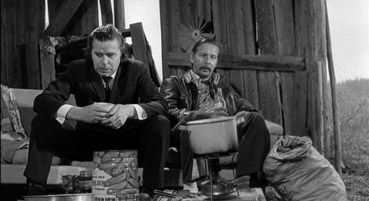
The
journey begins when the hulking, coffee-addicted Valto (Mato
Valtonen – imagine a Finnish Ron Perlman with a rock 'n'
roll haircut), who appears to make a living sewing clothing
for his intolerant mother, is informed that the house is
devoid of his favourite brew. In a quiet rage he locks his
mother in a closet, steals her money and hits the road with
a portable coffee maker and his vodka-swilling auto-mechanic
friend Reino (Matti Pellonpää). When they take a break they are eyed up by
Russian Klavdia (Kirsi Tykkyläinen) and Estonian Tatjana
(a perkier than usual Kati Outinen), two women looking to
catch a ride from these "two dumb Finns." Despite
the language barrier, the women attempt friendly communication
with their hosts, only to have both men regress into a coffee
and vodka-fueled state of sulking shyness.
The
two lead characters may be as forlorn as ever, but the underlying
sadness and unbroken misfortune of the Underdog Trilogy
is completely absent here, making it one of Kaurismäki's
most openly humorous films. This doesn't mean it's crammed
with funny one-liners and amusing pratfalls – the comedy
comes totally from character moments, whether it be Valto's
peculiar snoring, Reino casually wiping the oil dipstick
on his companion's tie, or the hilarious 2-shot in which
Reino gets stuck into a second vodka bottle while Valto
stares ahead, jittering with the effects of a caffeine overload.
The bulk of the humour stems from Valto and Reino's
cheerless discomfort at their female companions, highlighted when the pair are reluctantly obliged to share
hotel rooms with their guests – traditionally a moment for
the breakdown of interpersonal barriers and the blossoming
of romance, here it proves nothing of the sort, with Reino
drinking himself into a stupor and Valto gruffly reluctant
to even acknowledge Klavdia's presence.
This
communication gap is clearly about more than gender shyness and
it's here that non-Finnish viewers are likely to miss out,
as issues of culture and language and even history enter
an equation that many of us do not have all the numbers
needed to successfully calculate. But in a film this rich
in character detail, this presents no real barrier to appreciation
and enjoyment, and for me added an air of intrigue that
prompted an immediate phone call my Finnish friends for
their insights (which I'd be sharing right at this moment
had they had actually been in).
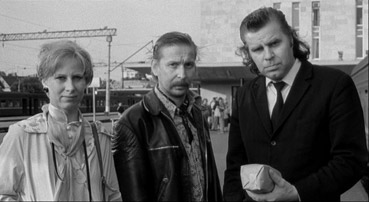
With
the barrier between the sexes seemingly insurmountable,
the gentle, hesitant hints of attraction that develop seem
all the more touching, encapsulated in the quietest of
moments, as when Tatjana rests her head on Reino's shoulder
and he nervously puts his arm round her, or in the present
that Klavdia later gives to Valto as she boards her train.
The
decision to shoot in black and white may well be one prompted
by a fondness for road movies of years past (I was occasionally
reminded of Wim Wenders' 1974 Alice in the Cities
and 1976 Kings of the Road).
It also shifts the narrative slightly out of the here and
now, something whose relevance only really registers in
the penultimate scene, an outrageous stop for coffee that
at first seems like a flashback but proves most likely to
be the product of Valto's fantasy. The implications of this
are intriguing. As he returns home to unlock his mother
and return to normality, we are left to wonder if, as in
fellow minimalist Kitano Takeshi's 1990 3-4 x jûgatsu
[Boiling Point], the entire journey was
after all just one of the mind.
Either
way, Take Care of You Scarf, Tatjana is
a low key delight and probably Kaurismäki's most upbeat
(fictional) movie to date. It's winning example of the appeal of this
particular director's style, and proof positive that unhappy
people do not necessarily make for an unhappy film.
Drifting
Clouds (Kauas pilvet karkaavat)
is the first film in what has been dubbed The Loser Trilogy,
which continued in 2002 with Man Without a Past
and concluded recently with Lights
in the Dusk. It was originally intended as
a follow-up to Shadows
in Paradise, with the same characters played
by the same two leads, but following the death of favourite
actor Matti Pellonpää, the story and characters
were re-written and a second trilogy of misfortune was born.
The film is dedicated to Pellonpää's memory.
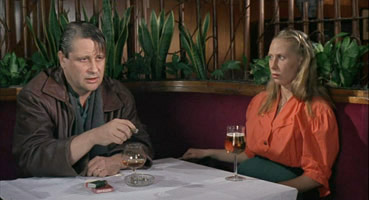
I
have a special relationship with Drifting Clouds,
one I've already touched on in my coverage of Lights
in the Dusk. It was the first Aki Kaurismäki
film I saw and in my thirteen years of co-running a film
society, was the film that pulled in the smallest audience we
ever had. This should not in anyway be taken as an indication
of the quality of the film, which was greatly admired by
those who did attend – we screened it on a bitterly cold
and windy winter's night at a cinema close to the
seafront at the same time as a crucial football
match was being shown on TV. The sports fans had offered
apologies in advance, but the rest had taken one look at
the weather and read the words "Finnish" and "downbeat"
and decided that maybe an evening in front of the fire with
a few glasses of wine might be altogether more agreeable.
If
you're working your way through Kaurismäki's filmography
via Artificial Eye's three-film collections, then Drifting
Clouds will seem both typical of its director and
a slight break from tradition. The luckless
couple at its centre are instantly recognisable, a happily
married pair consisting of tram driver Lauri (Kari Väänänen)
and head waiter Ilona (Kati Outinen), whose lives take a
downward turn when they are both laid off from their respective
jobs, Lauri due to personnel cutbacks, Ilona when the bank
calls in loans that cannot be repaid, forcing the restaurant
manager to sell up.
There's
an interesting imbalance to Kaurismäki's handling of
the two events. Lauri's redundancy is partly the result
of bad luck when he selects the lowest card in a job loss
lottery and his reaction is restricted to a grumpy cinema
visit and the unhappy revelation of the bad news to his
wife. The restaurant's closing night, however, is awarded
the sort of screen time rare for a Kaurismäki film,
an extended sadness for the loss of an institution and the
breakup of a working unit within, giving the scene the
sort of emotional bite rare for one situated so early in a film. I began to suspect that there was
an autobiographical element to this, though it is later
revealed to have a narrative purpose, with the couple's
future increasingly linked more to the fate of Ilona rather than
that of her husband.
As
with the earlier Ariel,
the drama has its foundation in social commentary, evident
in both the effects of recessional economics on the lives
of the Lauri and Ilona and the unprincipled opportunism
it brings out in others, notably the one-man employment
agency who demands 500 Markka to reveal the name and address
of a potential employer, and the unpleasant bar owner who
you just know is going to stitch Ilona up before the film
is over. Later the restaurant's bulky doorman Marletin complains
bitterly about the decline of Finnish society and its increasingly
unsociable drinking habits, a small speech that can't help
but sound like one from the director's own heart.
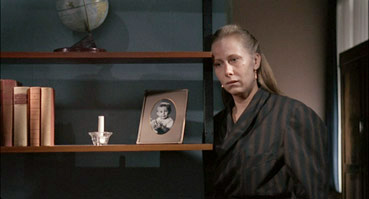
The
link with Ariel is echoed in the sometimes
tortuous run of misfortune that afflicts the couple, which
is intermittently balanced by the expected doses of Kaurismäki
humour, always delivered with the straightest and sometimes
sternest of faces. My favourite example sees the Liani storm
out of a movie with Ilona in tow to confront the cashier
and angrily demand his money back, only to be reminded that
he didn't pay anyway and that if he's leaving he should
take his dog, which is promptly handed to him from behind
the counter. When Ilona suggests the film was good, Liani
is unrepentant:
| Liani: |
It
was nonsense. A comedy? Didn't laugh once. |
| Ilona: |
It's
not the cashier's fault. |
| Liani: |
Got
to vent my spleen, at least. |
| Ilona: |
But
she's your sister. |
| Liani: |
More
shame on her. |
It's also in this scene that you'll catch a rare Kaurismäki
nod to other filmmakers, with posters for L'Agent,
L'Atalante and Jim Jarmusch's Night
on Earth, whose cast included Kaurismaäki
regulars Matti Pellonpää and Sakan Kuosmanen,
as well as the actor and assistant producer of this very film,
Klaus Heydemann.
Despite
my usual aversion to movie formula, this is one time I found
myself inwardly begging for things to work out for the couple
in the end, and in partially playing to such expectations,
Drifting Clouds manages a surprising but
richly satisfying mix of social realism and Hollywood-style
triumph in the face of adversity. But it's still every inch
a Kaurismäki movie, from the run of painfully rotten
luck that the hapless couple suffer to the stare-ahead deadpan
exchanges and offbeat encounters, delicious moments that
find comedy and humanity in the darkness.
There's
a logic to the idea that a director with a distinctly
minimalist cinematic style should one day make a silent
movie, stripping his drama of audible dialogue and telling
his story purely with camera, expression and gesture.
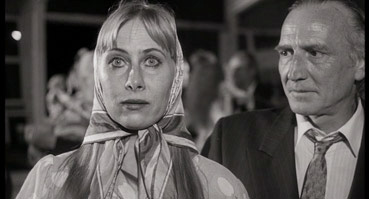
In
common with many of its silent predecessors, Juha,
which is based on the novel by respected Finnish writer
Juhani Aho, is at its heart a morality tale of good
tempted and corrupted by evil. Juha (Sakari Kuosmanen) is
a farmer who lives a simple but fulfilling life with his
younger but devoted wife Marja (Kati Outinen). This all
changes when grizzled mobster Shemeikka's car breaks down
and Juha offers to fix it. As soon as Shemeikka lays eyes
on Marja he becomes determined to have her, but despite
being fascinated by this stranger, she resists – she is,
after all, a married woman. The next morning Shemeikka departs,
but later returns with gifts for the couple and to step
up his campaign to convince Marja to leave with him. Knowing
nothing of Shemeikka's true nature and blinded by a romantic
vision of what life with him would mean, Marja accepts.
With Juha in a state of drunken unconsciousness, Marja packs
her bags and heads off for a new life with a new man.
That
things don't go well for Marja shouldn't surprise anyone
– Kaurismäki regulars will be expecting this from the
opening frame – but it also fits well with the tragic tone
of classic silent melodrama, where the relationship problems
of ordinary folk could be realised on an emotionally epic
scale (see F.W. Murnau's 1927 Sunrise
and King Vidor's 1928 The Crowd for examples
of this at its best). Juha is left lonely and miserable,
while Marja is mortified by the world she has fallen headlong
into. Instead of an idyllic life with her man, she's given
a bed in a crowded house and expected to share company with
a group haggard gangsters' wives who look like they're on
loan from David Lynch.
From
here on the narrative follows a straightforward and for the most
part expected path, as Marja realises just what she has lost
and Juha is taunted into vengeful action. In
this the film is true to its influences, keeping its plot
uncluttered, its morality uncomplicated and painting its
characters in generally broad strokes. Emotions are inevitably
exaggerated, but a neat balance is struck here between silent
movie melodramatics and a toned-down modern naturalism,
which helps steer the film clear of parody and enables us
to care for characters that laughter might otherwise have
kept at a distance. Gestures only become stylised
in the final reel, with fights won with a grab of the lapels
and a hard stare, and a particularly brutal act shown only briefly
in shadow and then shielded from view by a closing door
(the staging of violence just out of frame is a familiar
Kaurismäki touch).
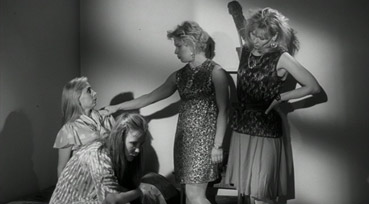
It
shouldn't really work, but it does and sublimely so. The performances
hit just the right note, with Kati Outinen once again taking
deserved centre stage, though as Shemeikka, André
Wilms effectively suggests that beneath his seedy surface
there lies a genuine and potentially dangerous threat. Gorgeously
shot in black and white by Timo Salminen and boasting a
rich and varied score by Anssi Tikanmäki that blends
orchestral sweep with traditional folk tunes and rock 'n'
roll, it captures the feel of the great silent movie dramas
without faking an 'old film' look, presented with modern quality
but as if the technology for synchronised
sound and colour had simply never been developed.
A
final note for movie fans – watch out for the blackboard
located behind the desk of the detective Juha visits.
As
with Volume 1,
the transfer quality is consistently high, the anamorphic
1.85:1 transfers all displaying similarly impressive contrast
and detail levels. The black and white beauty of Juha
is particularly well captured, with excellent tonal range
and coal-hole-at-night black levels.
The
Dolby 2.0 stereo tracks on Take Care of Your Scarf,
Tatjana and Drifting Clouds are,
as were the soundtracks on Volume 1, strikingly
clear and well mixed. Juha has the option
of a 5.1 surround track and this is the best of the lot,
a full, rich soundtrack that really does justice to Anssi
Tikanmäki's score.
Once
again, none, and once again a shame.
The
lack of extra features is particularly missed here, as some
background on the language and cultural subtleties of Take
Care of Your Scarf, Tatjana, the original intentions
for Drifting Clouds and the thinking behind
the silent movie approach to Juha would
all have been welcomed. But as with Volume 1 it's the films that are the draw, and they alone are worth
the purchase price, three more gems from the master of cinematic
deadpan, very well presented for DVD. Roll on Volume 3!
|